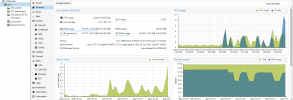Hello, first i want to say, im new to proxmox.
I have proxmox installed a ryzen 3900x 16g ram ddr 4 3600MHX CL 16, 512GB m2 SATA ssd, GTX1060 6GB and as guest VM i have install popos 20.10 win7 and win 10
Configs pop os:
bios: ovmf
boot: order=scsi0;net0
cores: 4
cpu: max
efidisk0: local-lvm:vm-101-disk-1,size=4M
memory: 4096
name: popos-gpu
net0: e1000=FA:85:3C:8C 3:0D,bridge=vmbr0,firewall=1
3:0D,bridge=vmbr0,firewall=1
numa: 0
ostype: l26
scsi0: local-lvm:vm-101-disk-0,cache=writeback,size=60G
scsihw: virtio-scsi-single
smbios1: uuid=355a3f8b-621a-4fb3-b3ed-7b90043a18ba
sockets: 1
vmgenid: 61f5bf5d-d8ae-4d94-931e-14010aeeedfe
Configs win7:
agent: 1
boot: order=sata1
cores: 2
cpu: host,hidden=1
machine: pc-q35-5.1
memory: 3000
name: win7
net1: e1000=1A:89:FD:4B:42:3B,bridge=vmbr0,firewall=1
numa: 0
ostype: win7
sata1: local-lvm:vm-103-disk-1,size=32G
sata2: local:iso/virtio-win-0.1.185.iso,media=cdrom,size=402812K
smbios1: uuid=981fe65d-078f-4e05-9659-ef947055ce57
sockets: 1
usb0: host=0471:485d
vga: virtio
vmgenid: cab0f68a-4373-43fb-975f-93c93533e52b
Configs win10:
agent: 1
balloon: 3000
bios: ovmf
boot: order=scsi0;ide2;net0
cores: 8
cpuunits: 4096
efidisk0: local-lvm:vm-100-disk-1,size=4M
hostpci0: 0000:2b:00,pcie=1,x-vga=1
ide2: local:iso/Windows.iso,media=cdrom
kvm: 1
machine: pc-q35-5.2
memory: 4096
name: win10
net0: virtio=6A:74:C3:03:1A:09,bridge=vmbr0,firewall=1
numa: 0
ostype: win10
sata0: local:iso/virtio-win-0.1.185.iso,media=cdrom,size=402812K
scsi0: local-lvm:vm-100-disk-0,size=60G
scsihw: virtio-scsi-pci
smbios1: uuid=dfdc0750-442c-409a-91a1-3a18e2f8ec98
sockets: 1
usb0: host=045e:0719,usb3=1
vmgenid: b7748343-2b99-431b-a8ea-e32c2f2c1551
As i said im new to proxmox and i dont know if this is normal or not.
So im experiencing really slow performace of popos (i didnt testes windows performances)
I use pop os as a nginx php slq server ruinning a webapp.
First thing i noticed that if i attach gpu to popos my webapps performance slows in half, for example a script that runs 8s, with gpu attached runs 16s
If pop os vm is the only one running runs decent (5-8s), yet nothing near this pc bare metal (around 4-5s) running same pop os with exact same webapp.
Now if i start any other vm, or vm install is in progress, that script execution went up to 60-150s
All vm are installed on same sdd as proxmox.
Anyone has some idea what can be the problem here? Thanks!
[Edit]
i want to add, i have installed another popos vm running same app and running simulataious in proxmox, and my accessing them separately script finishes in 7-8s,
But if i send the request to both VM.s at the same time i have one vm finsihes in 24.994221925735 and other in
14.608044147491
I had check and IO delay goes up to 34%
I have proxmox installed a ryzen 3900x 16g ram ddr 4 3600MHX CL 16, 512GB m2 SATA ssd, GTX1060 6GB and as guest VM i have install popos 20.10 win7 and win 10
Configs pop os:
bios: ovmf
boot: order=scsi0;net0
cores: 4
cpu: max
efidisk0: local-lvm:vm-101-disk-1,size=4M
memory: 4096
name: popos-gpu
net0: e1000=FA:85:3C:8C
numa: 0
ostype: l26
scsi0: local-lvm:vm-101-disk-0,cache=writeback,size=60G
scsihw: virtio-scsi-single
smbios1: uuid=355a3f8b-621a-4fb3-b3ed-7b90043a18ba
sockets: 1
vmgenid: 61f5bf5d-d8ae-4d94-931e-14010aeeedfe
Configs win7:
agent: 1
boot: order=sata1
cores: 2
cpu: host,hidden=1
machine: pc-q35-5.1
memory: 3000
name: win7
net1: e1000=1A:89:FD:4B:42:3B,bridge=vmbr0,firewall=1
numa: 0
ostype: win7
sata1: local-lvm:vm-103-disk-1,size=32G
sata2: local:iso/virtio-win-0.1.185.iso,media=cdrom,size=402812K
smbios1: uuid=981fe65d-078f-4e05-9659-ef947055ce57
sockets: 1
usb0: host=0471:485d
vga: virtio
vmgenid: cab0f68a-4373-43fb-975f-93c93533e52b
Configs win10:
agent: 1
balloon: 3000
bios: ovmf
boot: order=scsi0;ide2;net0
cores: 8
cpuunits: 4096
efidisk0: local-lvm:vm-100-disk-1,size=4M
hostpci0: 0000:2b:00,pcie=1,x-vga=1
ide2: local:iso/Windows.iso,media=cdrom
kvm: 1
machine: pc-q35-5.2
memory: 4096
name: win10
net0: virtio=6A:74:C3:03:1A:09,bridge=vmbr0,firewall=1
numa: 0
ostype: win10
sata0: local:iso/virtio-win-0.1.185.iso,media=cdrom,size=402812K
scsi0: local-lvm:vm-100-disk-0,size=60G
scsihw: virtio-scsi-pci
smbios1: uuid=dfdc0750-442c-409a-91a1-3a18e2f8ec98
sockets: 1
usb0: host=045e:0719,usb3=1
vmgenid: b7748343-2b99-431b-a8ea-e32c2f2c1551
As i said im new to proxmox and i dont know if this is normal or not.
So im experiencing really slow performace of popos (i didnt testes windows performances)
I use pop os as a nginx php slq server ruinning a webapp.
First thing i noticed that if i attach gpu to popos my webapps performance slows in half, for example a script that runs 8s, with gpu attached runs 16s
If pop os vm is the only one running runs decent (5-8s), yet nothing near this pc bare metal (around 4-5s) running same pop os with exact same webapp.
Now if i start any other vm, or vm install is in progress, that script execution went up to 60-150s
All vm are installed on same sdd as proxmox.
Anyone has some idea what can be the problem here? Thanks!
[Edit]
i want to add, i have installed another popos vm running same app and running simulataious in proxmox, and my accessing them separately script finishes in 7-8s,
But if i send the request to both VM.s at the same time i have one vm finsihes in 24.994221925735 and other in
14.608044147491
I had check and IO delay goes up to 34%
Last edited:



